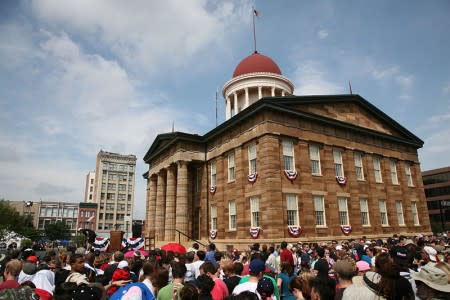Reaction to the Supreme Court’s historic campaign financing decision
The McCutcheon case, also called Citizens United 2 by supporters and detractors, is now history and people can make an unlimited number of federal campaign donations in a two-year period. So is that a good thing or a bad thing? Here’s reaction to this historic Supreme Court decision.
To recap, the Court said on Wednesday that individual donors can make as many contributions as they’d like in a two-year federal campaign cycle. The McCutcheon decision doesn’t extend the $2,600 limit a donor can give to a federal candidate in each primary and a general election or the $32,400 limit that can go to a national party committee.
But it removes a cap of $123,200 for total contributions, and the only limit is the number of candidates who can potentially receive donations. With those donations also coming to primary races, total possible spending could easily reach $3 million per donor, if multiple candidates receive funds.
Here’s what the top news websites and interest groups involved in the case are saying:
SCOTUSblog
Constitution Daily contributor Lyle Denniston was in the courtroom when the opinions were read.
“The decision was not as sweeping as the Court’s ruling four years ago, removing all restrictions on what corporations and labor unions can spend of their own money in federal campaigns (Citizens United v. Federal Election Commission), which has led to billions of dollars spent on politics,” Denniston said. “Even so, the practical result of the new ruling is almost sure to be that wealthy individuals will be able to spread their money around among more candidates and political groups.
The New York Times
Adam Liptak says “The ruling, issued near the start of a campaign season, will change and most likely increase the already large role money plays in American politics.”
He also quotes Justice Stephen Breyer’s impassioned dissent: “If the court in Citizens United opened a door,” he said, “today’s decision may well open a floodgate.”
Los Angeles Times
“The Supreme Court on Wednesday freed wealthy donors to give more money directly to congressional candidates, extending its controversial 2010 Citizens United decision that opened the door for unlimited independent spending on political issues,” David Savage says in his lead paragraph.
Savage also highlights a paragraph in Chief Justice Roberts’ majority opinion that compares political donations to Nazi parades and the Westboro Baptist Church.
“Money in politics may at times seem repugnant to some, but so too does much of what the 1st Amendment protects,” Roberts said.
If the amendment protects “flag burning, funeral protests and Nazi parades — despite the profound offense such spectacles cause — it surely protects political campaign speech despite popular opposition,” Roberts argues.
The Washington Post
Chris Cillizza breaks down the winners and losers in the case. Cillizza says the winners are fundraising committees and big donors; the losers are campaign finance reformers and also big donors.
The New York Times Editorial Page
Jesse Wegman calls the McCutcheon decision “another blow to democracy” and it’s only a matter of time before all limits are taken away from campaign spending.
“Nevertheless, many of the tireless lawyers who worked to take down the aggregate limits, no doubt, have the per-candidate cap in their sights. Justice Roberts wrote that this issue was not on the table, but given the current make-up of the court, that is little reassurance for a democracy that is already awash in the money of a very few extremely rich and unrepresentative donors,” Wegman says.
Republican National Committee
“Today’s Court decision in McCutcheon v FEC is an important first step toward restoring the voice of candidates and party committees and a vindication for all those who support robust, transparent political discourse,” RNC Chair Reince Priebus said in a Wednesday statement.
People For The American Way
“Our nation’s wealthiest people don’t need even more political influence, but that’s what today’s decision hands them. The Supreme Court has given its stamp of approval to a government unduly influenced by the rich and powerful,” the group said in a statement.
Cato Institute
“The Supreme Court today correctly struck down the biennial campaign contribution limits and gave those who contribute money to candidates and parties as much freedom as those who spend independently to promote campaigns and causes. But it should have gone further,” says Ilya Shapiro.
Shapiro sides with Justice Thomas’ concurring opinion that the Court should also overrule Buckley v. Valeo (1976) because “[c]ontributions and expenditures are simply ‘two sides of the same First Amendment coin.”
Recent Constitution Daily Stories
McCutcheon: Should the rich speak louder?
Constitution Check: What will the next challenges be to limits on money in politics?
Podcast: Floyd Abrams and Lawrence Lessig on the campaign finance decision


